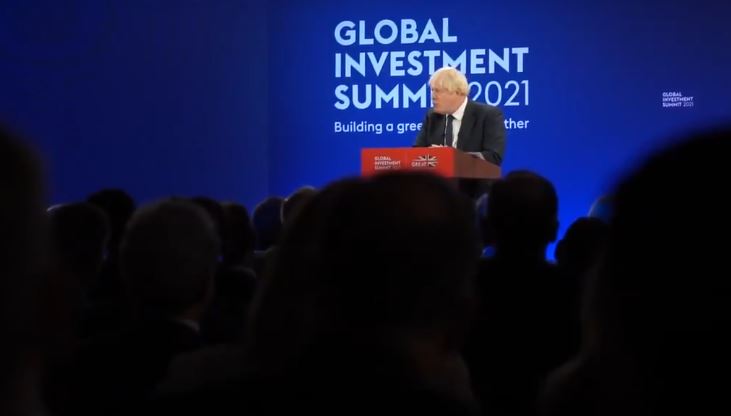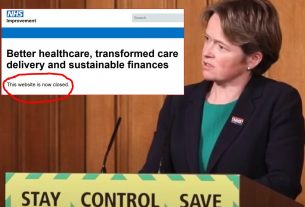The UK’s plan to reach net-zero greenhouse emissions by 2050 will “secure” 440,000 green jobs and “unlock” £90 billion in private investment, according to ministers.
With the start of Cop26 in Glasgow less than two weeks away, Boris Johnson finally published his long awaited plan to make the UK net zero in greenhouse gas emissions by 2050 – through expanding electric cars, growing the off-shore wind sector, a new £120m nuclear power station and investments in new technologies to help combat the climate crisis.
However, the government’s 368 page Net Zero Strategy: Build Back Greener was immediately dismissed by campaigners and climate experts for not going far enough, while others criticised the UK government’s continuing support for fossil fuels.
Miliband says plans are a ‘massive letdown’
Labour’s Ed Miliband, the shadow business and energy secretary, told the House of Commons the plans are a “massive letdown” in the Commons, and later said: “The glaring gap in the government’s net zero strategy is the failure to invest at scale in the green transition. This is the prudent, responsible choice rather than leaving homeowners and businesses on their own.”
Professor of energy and climate change at University of Manchester, Kevin Anderson, said the government’s strategy “falls far short of both its Paris and G7 temperature and equity commitments.”
He continued: “Scour the associated spreadsheets and the numbers reveal a story of subterfuge, delusion, offsetting and piecemeal policies – all dressed up as a shiny new strategy for Cop26. Remove the reliance on other nations offsetting our emissions and today’s children deploying ‘negative emission technologies’ to suck our CO2 out of the atmosphere, and the UK’s total carbon budget is more in line with 2.5-3C of warming than 1.5-2C.
“As our government rubs its hands at the prospect of oil revenues from the Cambo and Clair South fields, invests £27bn in new roads, [supports] overseas airport expansions, and pumps £1bn of taxpayers’ money into a huge new liquefied natural gas field in Mozambique, its PR machine, accompanied by the voices of high-emitting CEOs and senior academics, swings into full gloss paint mode. The climate, however, will see through this, responding as it always does to emissions rather than slick presentations, accountancy scams and half-baked strategies.”
£5,000 grants for 90,000 households
One headline grabbing policy within the strategy – £450 million to fund £5,000 grants for heat pumps to replace gas fired boilers in homes – was immediately dismissed by critics and energy experts as insufficient and not fully thought through.
The £450 million fund means only 90,000 households will qualify for the vouchers to replace gas boilers with heat pumps – representing a tiny fraction of the UK’s 25 million homes with gas boilers.
Air source heat pumps cost from £6,000 to £18,000 and Mike Childs, head of science at Friends of the Earth, said: “These grants will only incentivise the best-off households.”
The Telegraph is reporting the UK has a “severe shortage of plumbers to fit millions of homes” with the eco-friendly heat pumps. The Heat Pump Association (HPA) estimates 60,000 workers will be required to install the devices by 2028 – but there are only 1,800 people currently trained to do so.
Johnson’s £400m deal with Bill Gates to fund green revolution
Boris Johnson and US billionaire Bill Gates have agreed a £400 million partnership to boost the development of new technologies that will power what the prime minister today (October 19) called a “green industrial revolution”.
Johnson told the Global Investment Summit – being held at London’s Science Museum – the partnership with Gates will help the UK develop emerging technologies in carbon capture and storage, battery life, hydrogen and zero-carbon aviation (jet zero).
Such technologies are currently too costly to be commercially viable but Johnson said he believes they “have massive potential”.
“We will only achieve our ambitious climate goals if we rapidly scale up new technologies in areas like green hydrogen and sustainable aviation fuels – technologies that seemed impossible just a few years ago,” Johnson said.
“I can deploy billions – with the approval of the chancellor, obviously – but you in this room, you can deploy trillions,” he added, telling the gathering of over 200 business leaders and investors –including JP Morgan, Blackrock and Goldman Sachs – that they collectively managed £24 trillion of assets.
Gates – ‘We need to reduce the costs of clean technologies’
Gates, the co-founder of Microsoft, has pledged to match the UK government’s £200 million funding of the Breakthrough Energy Catalyst – “a coalition of private investors concerned about the impacts of accelerating climate change”, set up in 2015 by Gates to fund “innovations that will lead the world to net-zero emissions.”
Gates said the partnership with the UK government will “accelerate the deployment of these critical climate solutions, helping to make them more affordable and accessible.
“In order to achieve net-zero emissions, we need to reduce the costs of clean technologies so they can compete with and replace the high-emitting products we use today – I call this difference in price the Green Premium.
“Working with public and private sector leaders, including the UK, Catalyst will be a key vehicle for reducing Green Premiums, building the clean industries of tomorrow, and creating lasting jobs in communities around the world.”




